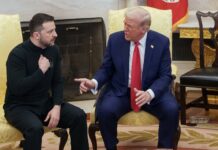As political instability has increased following numerous coups across West Africa, one of the misconceptions that has often been shared around, particularly on social media, is the notion that the coups took place to fight against French imperialism in the region. This idea is, however, not the reality on the ground.
While anti-French sentiments have spread across the region, to say that it is the reason for the coups is not correct. It is a vast misunderstanding and oversimplification of the current political instability faced by nations within West Africa.
Rather, the main reason for the coups that have taken place has been due to insecurity across the Sahel, due to the presence of numerous armed groups operating in the region. In fact, following many of the overthrows of civilian governments, insecurity has typically been cited as the reason for the coup.
The military juntas have frequently claimed that the civilian governments have failed in their efforts to combat insurgents. They have often accused the government of failing to provide the troops with necessary support in their battles against militant groups. Therefore, they announce that they will take over control of the country for a transitional period until they manage to fight off the terrorist threat and restore peace in the country.
Like in Burkina Faso, following the ouster of the civilian president, Roch Kaboré, the military junta (named the Patriotic Movement for Safeguard and Restoration) led by Paul-Henri Sandaogo Damiba, pledged to improve security and eventually restore civilian rule in Burkina Faso.

Another significant reason for the coups was the presence of opportunities. Civilian governments, plagued by insecurity, economic stagnation, and corruption, lost the support of large segments of the population. This widespread discontent left them vulnerable to power grabs.
As was the case within Niger. The civilian government led by President Mohamed Bazoum had been overthrown by members of his own presidential guard. Rather than seeing any kind of major unrest among members of the population, calling for a restoration of the Nigerien civilian government, there had been rallies held celebrating the ouster of the government. The rallies had been populated by people who had been fed up with instability and economic reality within Niger, hoping the government overthrow would usher in a new era of change.
What we have never seen following the coups has been any military leader, taking power and proclaiming that the reason behind the coup is to tackle French imperialism within their country. That has never happened and likely will never happen
French Imperialism in West and Central Africa
Sometimes when you see discussions around the coups that have taken place, you see people speak about how West African nations are finally fighting back against the imperialism of France. They praise the coup leaders for their “bravery” in standing up against the French government and fighting for African sovereignty.
Leaders such as Ibrahim Traoré have been held up as great leaders, mainly because of his speeches where he has spoken against French interests within Burkina Faso.
I remember watching a news report on TV and watching a Nigerien citizen being interviewed following the coup that overthrew President Mohamed Bazoum. In this interview, the man boldly asserted that all of the problems faced by African citizens are a direct result of France.
Listening to this kind of rhetoric, it would not be surprising for people to somehow come to the false conclusion that numerous West African nations are still under some kind of French colonial rule. Or that the French government is somehow secretly still in complete control over the governmental affairs of their former colonies within West Africa.
It would, however, be untrue to claim that France does not have any influence over many of its former colonies across Africa. It is certainly true that France does have outsized influence over many of its former colonies. For example, many of the currencies used by numerous former French colonies in Africa use the CFA Franc as their national currency. This currency is pegged to the Euro and member nations have been required to deposit half of their foreign exchange reserves with the French Treasury.

Proponents of this thinking argue that France is running a neo-colonial empire within its former colonies in West and Central Africa through its influence over their national currency and through French mining companies that operate within the region. Similarly, they argue that the presence of thousands of French troops stationed across the region is another way France maintains its influence over its former colonies.
Do African governments lack agency?
My issue with this type of thinking is that it often takes away any agency from African governments. It paints them as if they are just bystanders as France supposedly marches in and takes over their country’s territory, which is not the case.
West and Central African governments could always change their currencies away from the CFA Franc currency and adopt their own national or regional currency, like the Republic of Guinea in 1960, but they don’t do that. Because, while governments do lose control over their country’s monetary policy with the CFA Franc, they benefit from the stability of the CFA, unlike neighbouring countries that have seen major economic shocks due to the unstable nature of their national currencies. Likewise, with the CFA Franc, they benefit from the ease of trade with France and other member nations that use the currency.
Similarly, French troops stationed in numerous countries within West and Central Africa did not just appear out of nowhere. Neither did they barge in and impose themselves on the people of the countries they are stationed in. Rather, they had arrived after being requested by African governments to come and aid them in their fights against armed groups operating in their countries.
Likewise, a common misconception about the roles of these French troops stationed in African countries, is that they are there to directly assist in the fight against insurgents, which is not true either. Often people have lambasted French troops for failing to provide security in the countries they are stationed in, which is not their responsibility. Typically, these soldiers stationed in the region are for things like gathering intelligence and training African soldiers. The responsibility for providing security falls on the African governments, not the non-African, French soldiers stationed to help out in their operations.
Moreover, it’s not as if these soldiers are there forever or free to do as they please. They are there under specific conditions, dictating their movements and actions. And these French troops can be recalled or expelled at any time as we have seen in recent times in Mali, Burkina Faso and Niger.
Africa’s problems are Africa’s problems
It is time for Africans to move away from this mindset that the continent is still at the wins of imperial dominance. African countries have been independent for many decades at this point, yet complaints about supposed imperialism persist.
The majority of the problems faced by African countries today are not a result of our colonial past or imperialism in the modern day, it is a result of our governments. If we are going to improve things around the continent, we need to be willing to actually hold members of our governments to account for their actions, instead of always blaming Africa’s problems on external factors.
The coups did not happen because of any notion of a struggle against French imperialism. They have happened because most West African governments have failed to properly deal with the threat posed by insurgent groups operating within the region. This lack of action has led to the deaths of thousands and displacement of millions across West Africa.
Likewise, the rampant corruption within many of our governments has meant that many politicians are simply too self-serving to really care to do anything to properly tackle the insecurity. It is because of this corruption and lack of action, that so many people within the region welcome the overthrow of their civilian governments. Thus is the discontent and disillusionment felt by so many in the region.










